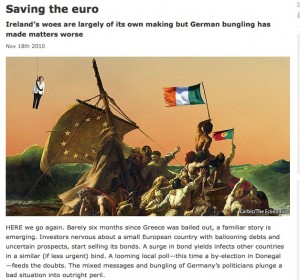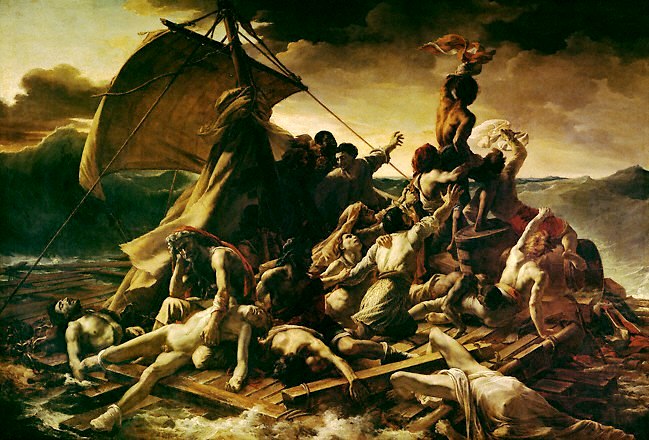The Economist has a wickedly funny front cover this week. It takes Gericault’s famous picture, The Raft of the Medusa, and Photoshops it to show the wretches on the raft holding Irish and other European flags, and adds, top-left, an RAF rescue helicopter winching in a particularly stolid-looking Angela Merkel to ‘help’.
The imagery becomes even more hilarious when you know the history of the original.
The painting depicts the aftermath of the wreck of the French naval frigate Méduse, which ran aground off the coast of today’s Mauritania on July 5, 1816. According to Wikipedia, at least 147 people
were set adrift on a hurriedly constructed raft; all but 15 died in the 13 days before their rescue, and those who survived endured starvation, dehydration, cannibalism and madness. The event became an international scandal, in part because its cause was widely attributed to the incompetence of the French captain acting under the authority of the recently restored French monarchy.
The references to cannibalism and incompetence are particularly relevant to Fianna Fail, hitherto known as “the political wing of the Irish construction industry”.
LATER: Lorcan Dempsey pointed me at John Banville’s essay in the New York Times:
It is the figures, mainly, that cow us into silence. It is estimated that the banking debt of this nation, which has a population of only 4.6 million, may be substantially more than 100 billion euros. That is 100,000 millions and rising. When we were at school it amused our science teachers to dazzle us with astronomical statistics — so many myriads of light years, so many zillions of stars — but the numbers that we are being forced to count on our too-few fingers now have nothing to do with the fanciful dimensions of outer space. They represent precisely the breadth and depth of the financial hole into which we have toppled headlong.
In the months after September 2008, when the Irish government, after a night-long crisis meeting, was forced to give a guarantee of some 400 billion euros — money we had no hope of ever having — to save the Irish banks from collapse, we used to say that it would fall to our children to pay for our financial folly. Now we know that it will be our children and our children’s children and our children’s children’s children, unto the nth generation, who will bear the burden of our debts, including the “substantial loan” from international lenders that officials now acknowledge is necessary.
There used to be a nice acronym that neatly expressed how the Irish people conceive of themselves: MOPE, that is, Most Oppressed People Ever. For a decade or so, when the Tiger was at its fiercest, we threw off the mantle of oppression, as once we had thrown off what used to be called “the yoke of British rule.” On Wednesday, the British chancellor of the Exchequer, George Osborne, announced in Brussels that his government stood ready to help Ireland in its hour of need. Oh, bitter day.
All the same, life goes on, somehow. We are learning a new resilience. Humbled as we are, we might even begin to learn social responsibility, a quality in which we have been singularly lacking up to now. Who knows, we may at last recognize the irreplaceable value of public and private honesty. But let us not light the firecrackers just yet.


